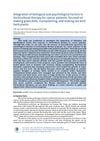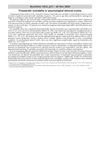 October 2023 in “Han'gug miyong haghoeji/Journal of the Korean society of cosmetology”
October 2023 in “Han'gug miyong haghoeji/Journal of the Korean society of cosmetology” Understanding psychological discomfort in hair loss can improve treatment outcomes.
 May 2023 in “Advances in medicine”
May 2023 in “Advances in medicine” Alopecia areata significantly impacts patients' mental health and quality of life.
 November 2022 in “Journal of Investigative Dermatology”
November 2022 in “Journal of Investigative Dermatology” COVID-19 patients with hair loss experienced greater cognitive deficits and more symptoms of depression, anxiety, and stress.
 November 2022 in “IntechOpen eBooks”
November 2022 in “IntechOpen eBooks” Hair loss can significantly impact a person's mental health, causing issues like anxiety and depression, and stress can trigger hair loss.

COVID-19 patients with hair loss experienced more cognitive issues and these issues were linked to higher levels of depression, anxiety, and stress.
 August 2022 in “Revista de la Universidad Industrial de Santander/Salud UIS”
August 2022 in “Revista de la Universidad Industrial de Santander/Salud UIS” Stress-related hair loss was reversed with a special medication.
 March 2021 in “CRC Press eBooks”
March 2021 in “CRC Press eBooks” Hair loss can cause and be caused by psychological issues.

Alopecia can negatively affect a person's mental health.

Hair loss can significantly affect mental health.
May 2021 in “JAMA Dermatology” Hair loss, not finasteride, is more strongly linked to psychological issues and suicidality.
 May 2020 in “Journal of Asian Medical Students' Association”
May 2020 in “Journal of Asian Medical Students' Association” Hair loss severity is linked to depression, not anxiety, in Filipino men, with older, less educated men with more hair loss at higher risk.
 January 2017 in “Journal of cosmetology & trichology”
January 2017 in “Journal of cosmetology & trichology” Hair loss can cause anxiety and depression, especially in young, single women, and early psychological support is important.
 January 2005 in “Korean Journal of Psychosomatic Medicine”
January 2005 in “Korean Journal of Psychosomatic Medicine” Women with alopecia often experience high levels of anxiety and depression, needing psychiatric help.
 21 citations,
April 2015 in “Psychology Research and Behavior Management”
21 citations,
April 2015 in “Psychology Research and Behavior Management” Cognitive-behavioral therapy is the best treatment for hair-pulling disorder, and combining it with other therapies could improve results.
 6 citations,
April 2019 in “Journal of Cosmetic Dermatology”
6 citations,
April 2019 in “Journal of Cosmetic Dermatology” Hair loss affects women's self-esteem; treatments like minoxidil can help.
1 citations,
April 2022 in “Journal of Cosmetic Dermatology” Androgenetic alopecia causes significant psychological distress, especially in women, and requires both medical and psychological support.
 40 citations,
November 2020 in “JAMA Dermatology”
40 citations,
November 2020 in “JAMA Dermatology” Finasteride may cause suicidal thoughts and mental side effects, especially in young people with hair loss.
 6 citations,
August 2016 in “Journal of women & aging”
6 citations,
August 2016 in “Journal of women & aging” Older women reported negative physical and psychological effects from Botox and facial fillers, feeling neglected by the medical system.
1 citations,
January 2021 in “Skin appendage disorders”  February 2024 in “International neuropsychiatric disease journal”
February 2024 in “International neuropsychiatric disease journal” Alopecia areata severely impacts quality of life, mental health, and work productivity.
 July 2019 in “Acta horticulturae”
July 2019 in “Acta horticulturae” Horticultural therapy helped cancer patients feel hopeful and positive about their disease experience.
 November 2020 in “Reactions Weekly”
November 2020 in “Reactions Weekly” Finasteride use linked to increased suicidality in patients under 45.
 926 citations,
June 2010 in “BMC Medicine”
926 citations,
June 2010 in “BMC Medicine” Polycystic ovary syndrome is a complex condition that affects women's mental, reproductive, and metabolic health throughout their lives.
 January 2024 in “International journal of yogic, human movement and sports sciences”
January 2024 in “International journal of yogic, human movement and sports sciences” Yoga Nidra improves well-being and reduces anxiety in women with PCOS.
 October 2023 in “The Open public health journal”
October 2023 in “The Open public health journal” Alopecia greatly affects Greek women's daily life, relationships, and self-image, with mixed social support and dissatisfaction with treatments.
 July 2023 in “Dermatology practical & conceptual”
July 2023 in “Dermatology practical & conceptual” Women with Female Pattern Hair Loss may experience more stress, anxiety, and depression, and have lower levels of BDNF, which could predict the psychological impact.
 1 citations,
August 2015 in “Current Sexual Health Reports”
1 citations,
August 2015 in “Current Sexual Health Reports” 5α-reductase inhibitors can cause serious and possibly lasting sexual and psychological side effects.
 July 2023 in “Journal of the European Academy of Dermatology and Venereology”
July 2023 in “Journal of the European Academy of Dermatology and Venereology” Hair loss can indicate various health issues, including serious diseases, hormonal imbalances, and can significantly affect personal life and mental health.
 January 2018 in “HAL (Le Centre pour la Communication Scientifique Directe)”
January 2018 in “HAL (Le Centre pour la Communication Scientifique Directe)” Male pattern baldness affects social interactions and mental health, and while treatments are being explored, hair transplants are currently the most effective solution.


























